Mario Lanza's masterpiece was The Great Caruso (Richard Thorpe, 1951). His voice in the film was so dazzling that an awestruck Arturo Toscanini called it the "voice of the century". The Great Caruso became the top-grossing film in the world in 1951, but if you're looking for a serious biography of legendary tenor Enrico Caruso, this film ain't it.
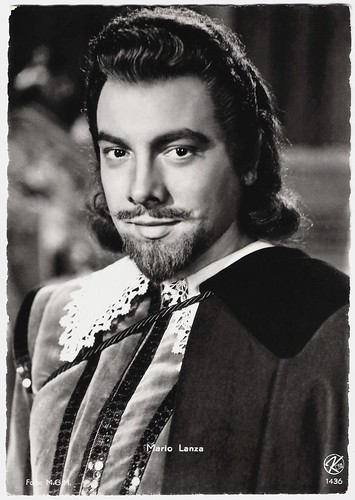
Austrian postcard by Kellner Fotokarten, Wien, no. 1436. Photo: MGM. Publicity still for The Great Caruso (Richard Thorpe, 1951).
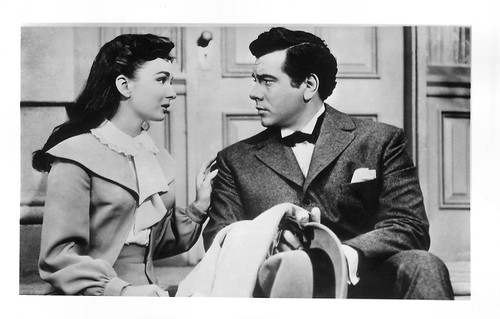
German photo-card. Photo: Metro-Goldwyn-Mayer. Publicity still for The Great Caruso (Richard Thorpe, 1951) with Mario Lanza and Ann Blyth.
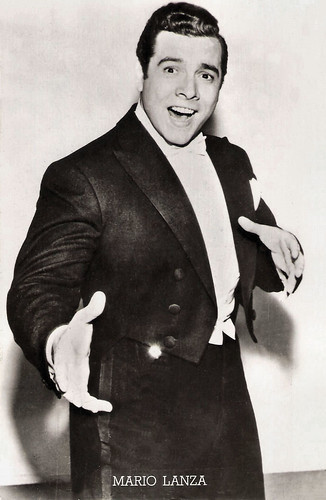
Belgian postcard, no. 452. Photo: MGM. Publicity still for The Great Caruso (Richard Thorpe, 1951).
The highly fictionalised The Great Caruso (Richard Thorpe, 1951) traces the life of Italian tenor Enrico Caruso (1873-1921). In his home town of Naples, the young Enrico (played with charm by Peter Edward Price) grows into an enterprising young man who realises his voice is potentially his fortune. Enrico (Mario Lanza) loves Musetta (Yvette Duguay), but he is unacceptable to her father, because he sings. When he later performs in New York, Caruso falls in love with Dorothy (Ann Blyth), the daughter of one of the Metropolitan Opera's patrons. He is unacceptable to her father, because he is a peasant. To New York patricians, Caruso is short, barrel chested, loud, emotional, unrefined. Their appreciation comes slowly.
The film depicts Caruso's lament that "the man does not have the voice, the voice has the man": he cannot be places he wants to be, because he must be elsewhere singing, including the day his mother dies. The film also stars Ann Blyth, Dorothy Kirsten, Eduard Franz and Ludwig Donath. Ann Blyth is lovely as Dorothy and gets to sing a little herself. And Mario Lanza's acting is natural and genuine.
Throughout the film, The Great Caruso (1951) stars from the Metropolitan Opera sing and the film offers some beautifully staged operatic arias. The music is glorious and beautifully sung by Lanza, Dorothy Kirsten, Jarmila Novotná, Blanche Thebom, Giuseppe Valdengo, and other top-notch opera stars.
Mario Lanza himself helped popularise The Great Caruso (1951) with an RCA Red Seal album of songs from the film. He sings the music in The Great Caruso with a robust energy; he is truly here at the peak of what would be a short career. His versions of 'Ave Maria', 'Cielo e Mar', 'E Lucevan le stelle', and especially his superb 'Vesti la Giubba' are spectacular. In all the film contains 27 vocal items, with not a dull moment to be found amongst them.
Enrico Caruso had been one of the pioneers of recorded music and had a long partnership with the Victor Talking-Machine Company (later RCA Victor). He was the first opera star to have his voice immortalised for all time.The Great Caruso (Richard Thorpe, 1951) won an Oscar for sound recording and received nominations for costume and set design.
Mario Lanza's larger than life personality and magnificent voice were never better served than here in The Great Caruso (1951). The film gives a taste of what Lanza might have become if he had had the discipline of a Caruso to stick to opera. The Great Caruso is a great film, and a tribute to two of the legendary voices of our time.
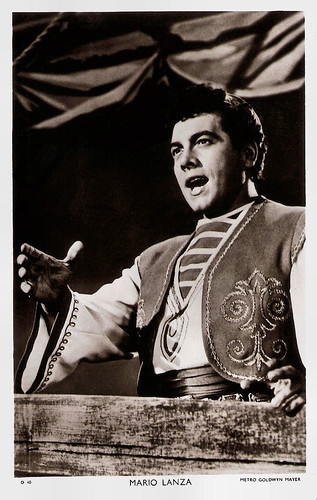
British postcard in the Picturegoer Series, London, no. D 40. Photo: Metro-Goldwyn-Mayer. Publicity still for The Great Caruso (Richard Thorpe, 1951).
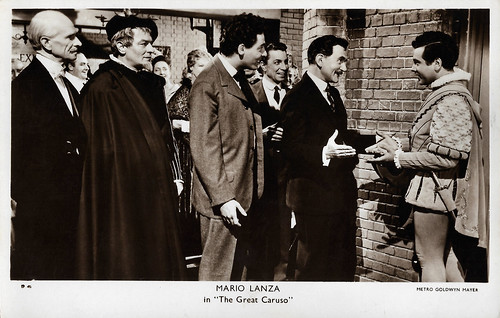
British postcard in the Picturegoer Series, London, no. D 46. Photo: Metro-Goldwyn-Mayer. Publicity still for The Great Caruso (Richard Thorpe, 1951).
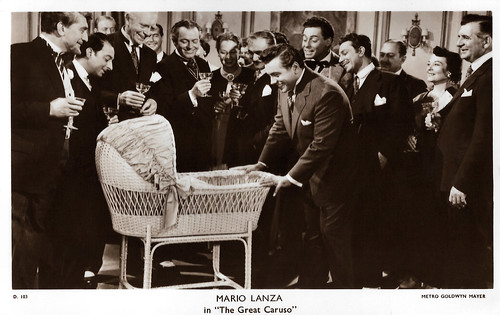
British postcard in the Picturegoer Series, London, no. D 103. Photo: Metro-Goldwyn-Mayer. Publicity still for The Great Caruso (Richard Thorpe, 1951).
The script of The Great Caruso (Richard Thorpe, 1951) was written by Sonya Levien and William Ludwig and 'suggested' by Dorothy Caruso's biography of her husband. The film opens with the hilarious credits: The events, characters and firms depicted in this photoplay are fictitious. Any similarity to actual persons, living or dead, or to actual firms is purely coincidental...
To say that liberties were taken with Enrico Caruso's life is to be modest. Caruso, like the man who portrayed him, was a man of large appetites although with a lot more self discipline. He had numerous relationships with several women and fathered two out of wedlock sons who are not in this film. Furthermore, his first role at the Metropolitan Opera was not Radames in 'Aida', as indicated in the film, but the Duke in 'Rigoletto'. Caruso also didn't die on stage during a performance of 'Martha' at the Metropolitan. He had a hemorrhage during 'L'Elisir d'amore' at the Met and could not finish the performance. He only sang three more times at the Met, his last role as Eleazar in 'La Juive'.
What is true is that Dorothy's father disowned her after her marriage, and left her $1 of his massive estate. They also did have a daughter Gloria together who died at the age of 79 in 2007. So the film bears little resemblance to the real Caruso's life, and is corny in the grand tradition of Hollywood musicals, but who cares?
A good, readable biography is Enrico Caruso Jr.'s 'Caruso: My Father and My Family'. In it, Caruso Jr. (half-brother of Gloria) compliments Mario Lanza for his performance in the film: "Mario Lanza was born with one of the dozen or so great tenor voices of the century, with a natural gift for placement, an unmistakable and very pleasing timbre, and a nearly infallible musical instinct conspicuously absent in the overwhelming majority of so-called 'great' singers. His diction was flawless, matched only by the superb Giuseppe di Stefano. His delivery was impassioned, his phrasing manly, and his tempi instinctively right -- qualities that few singers are born with and others can never attain. (...) I can think of no other tenor, before or since Mario Lanza, who could have risen with comparable success to the challenge of playing Caruso in a screen biography."
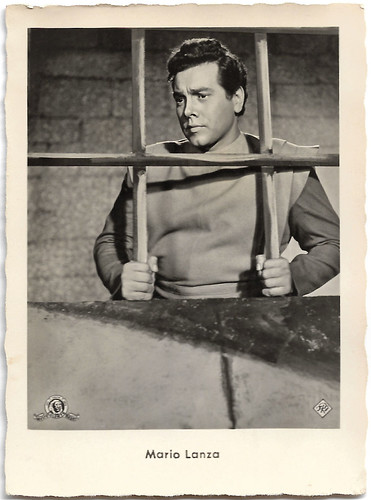
German collectors card by SR. Photo: Metro-Goldwyn-Mayer. Publicity still for The Great Caruso (Richard Thorpe, 1951).
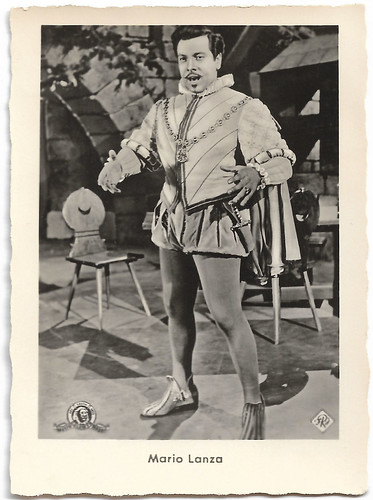
German collectors card by SR. Photo: Metro-Goldwyn-Mayer. Publicity still for The Great Caruso (Richard Thorpe, 1951).
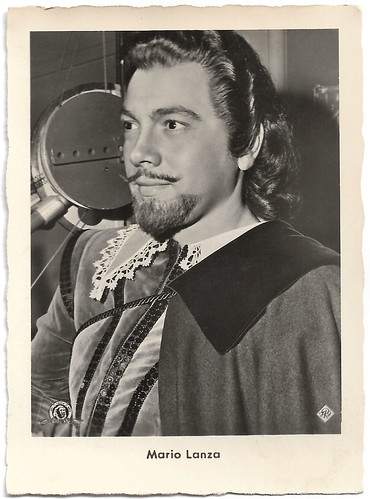
German collectors card by SR. Photo: Metro-Goldwyn-Mayer. Publicity still for The Great Caruso (Richard Thorpe, 1951).
Next Friday, we'll post a film special on Mario Lanza's film Because You're Mine (Alexander Hall, 1952).
Sources: Wikipedia and IMDb.

Austrian postcard by Kellner Fotokarten, Wien, no. 1436. Photo: MGM. Publicity still for The Great Caruso (Richard Thorpe, 1951).

German photo-card. Photo: Metro-Goldwyn-Mayer. Publicity still for The Great Caruso (Richard Thorpe, 1951) with Mario Lanza and Ann Blyth.

Belgian postcard, no. 452. Photo: MGM. Publicity still for The Great Caruso (Richard Thorpe, 1951).
Short, barrel chested, loud, emotional, unrefined
The highly fictionalised The Great Caruso (Richard Thorpe, 1951) traces the life of Italian tenor Enrico Caruso (1873-1921). In his home town of Naples, the young Enrico (played with charm by Peter Edward Price) grows into an enterprising young man who realises his voice is potentially his fortune. Enrico (Mario Lanza) loves Musetta (Yvette Duguay), but he is unacceptable to her father, because he sings. When he later performs in New York, Caruso falls in love with Dorothy (Ann Blyth), the daughter of one of the Metropolitan Opera's patrons. He is unacceptable to her father, because he is a peasant. To New York patricians, Caruso is short, barrel chested, loud, emotional, unrefined. Their appreciation comes slowly.
The film depicts Caruso's lament that "the man does not have the voice, the voice has the man": he cannot be places he wants to be, because he must be elsewhere singing, including the day his mother dies. The film also stars Ann Blyth, Dorothy Kirsten, Eduard Franz and Ludwig Donath. Ann Blyth is lovely as Dorothy and gets to sing a little herself. And Mario Lanza's acting is natural and genuine.
Throughout the film, The Great Caruso (1951) stars from the Metropolitan Opera sing and the film offers some beautifully staged operatic arias. The music is glorious and beautifully sung by Lanza, Dorothy Kirsten, Jarmila Novotná, Blanche Thebom, Giuseppe Valdengo, and other top-notch opera stars.
Mario Lanza himself helped popularise The Great Caruso (1951) with an RCA Red Seal album of songs from the film. He sings the music in The Great Caruso with a robust energy; he is truly here at the peak of what would be a short career. His versions of 'Ave Maria', 'Cielo e Mar', 'E Lucevan le stelle', and especially his superb 'Vesti la Giubba' are spectacular. In all the film contains 27 vocal items, with not a dull moment to be found amongst them.
Enrico Caruso had been one of the pioneers of recorded music and had a long partnership with the Victor Talking-Machine Company (later RCA Victor). He was the first opera star to have his voice immortalised for all time.The Great Caruso (Richard Thorpe, 1951) won an Oscar for sound recording and received nominations for costume and set design.
Mario Lanza's larger than life personality and magnificent voice were never better served than here in The Great Caruso (1951). The film gives a taste of what Lanza might have become if he had had the discipline of a Caruso to stick to opera. The Great Caruso is a great film, and a tribute to two of the legendary voices of our time.

British postcard in the Picturegoer Series, London, no. D 40. Photo: Metro-Goldwyn-Mayer. Publicity still for The Great Caruso (Richard Thorpe, 1951).

British postcard in the Picturegoer Series, London, no. D 46. Photo: Metro-Goldwyn-Mayer. Publicity still for The Great Caruso (Richard Thorpe, 1951).

British postcard in the Picturegoer Series, London, no. D 103. Photo: Metro-Goldwyn-Mayer. Publicity still for The Great Caruso (Richard Thorpe, 1951).
Any similarities are purely coincidental...
The script of The Great Caruso (Richard Thorpe, 1951) was written by Sonya Levien and William Ludwig and 'suggested' by Dorothy Caruso's biography of her husband. The film opens with the hilarious credits: The events, characters and firms depicted in this photoplay are fictitious. Any similarity to actual persons, living or dead, or to actual firms is purely coincidental...
To say that liberties were taken with Enrico Caruso's life is to be modest. Caruso, like the man who portrayed him, was a man of large appetites although with a lot more self discipline. He had numerous relationships with several women and fathered two out of wedlock sons who are not in this film. Furthermore, his first role at the Metropolitan Opera was not Radames in 'Aida', as indicated in the film, but the Duke in 'Rigoletto'. Caruso also didn't die on stage during a performance of 'Martha' at the Metropolitan. He had a hemorrhage during 'L'Elisir d'amore' at the Met and could not finish the performance. He only sang three more times at the Met, his last role as Eleazar in 'La Juive'.
What is true is that Dorothy's father disowned her after her marriage, and left her $1 of his massive estate. They also did have a daughter Gloria together who died at the age of 79 in 2007. So the film bears little resemblance to the real Caruso's life, and is corny in the grand tradition of Hollywood musicals, but who cares?
A good, readable biography is Enrico Caruso Jr.'s 'Caruso: My Father and My Family'. In it, Caruso Jr. (half-brother of Gloria) compliments Mario Lanza for his performance in the film: "Mario Lanza was born with one of the dozen or so great tenor voices of the century, with a natural gift for placement, an unmistakable and very pleasing timbre, and a nearly infallible musical instinct conspicuously absent in the overwhelming majority of so-called 'great' singers. His diction was flawless, matched only by the superb Giuseppe di Stefano. His delivery was impassioned, his phrasing manly, and his tempi instinctively right -- qualities that few singers are born with and others can never attain. (...) I can think of no other tenor, before or since Mario Lanza, who could have risen with comparable success to the challenge of playing Caruso in a screen biography."

German collectors card by SR. Photo: Metro-Goldwyn-Mayer. Publicity still for The Great Caruso (Richard Thorpe, 1951).

German collectors card by SR. Photo: Metro-Goldwyn-Mayer. Publicity still for The Great Caruso (Richard Thorpe, 1951).

German collectors card by SR. Photo: Metro-Goldwyn-Mayer. Publicity still for The Great Caruso (Richard Thorpe, 1951).
Next Friday, we'll post a film special on Mario Lanza's film Because You're Mine (Alexander Hall, 1952).
Sources: Wikipedia and IMDb.
The most underrated tenor of them all!
ReplyDelete